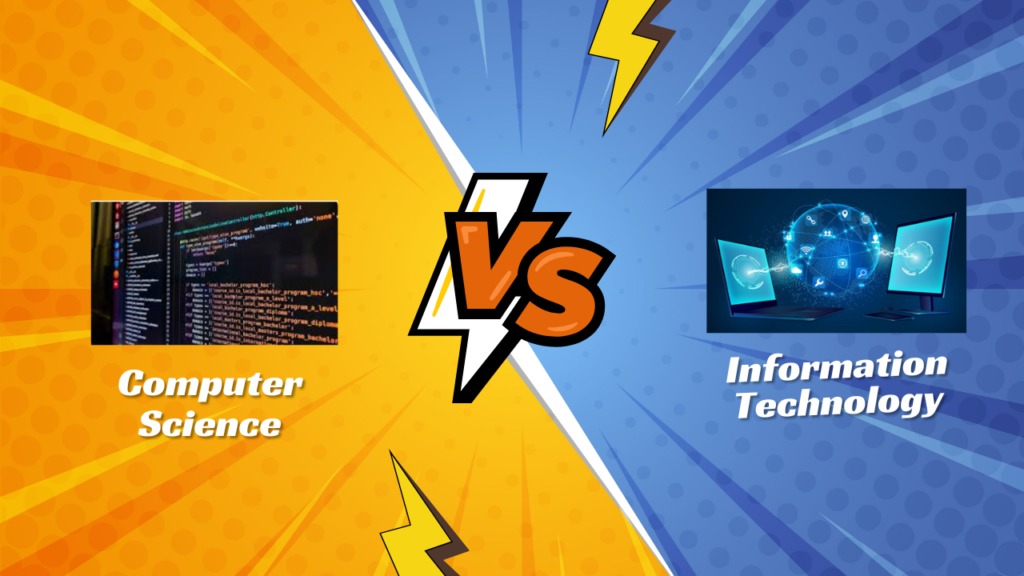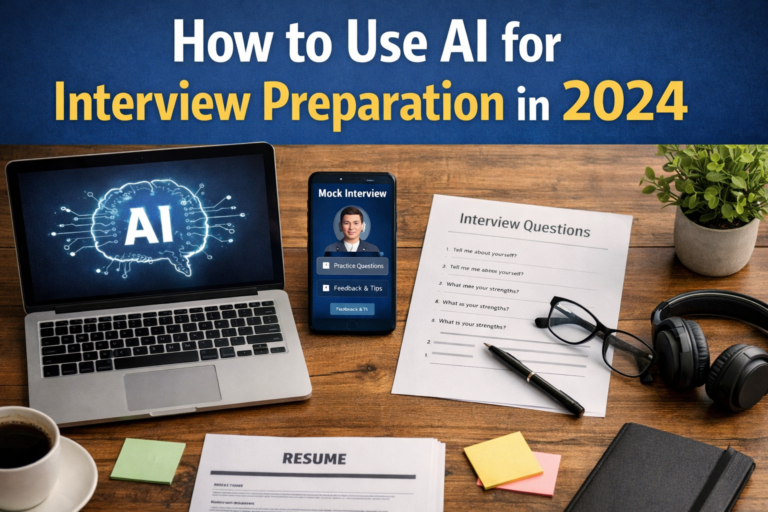Discover the differences between Computer Science (CS) and Information Technology (IT) degrees, including career paths in software engineering, data science, artificial intelligence, and cybersecurity. Learn about the required skills for CS and IT professionals, such as programming languages, data analysis, and network administration. Get insights into the job roles and salary prospects for CS and IT graduates. Read our comprehensive guide now!

What is Computer Science?
Computer science is the study of the principles and theories behind how computers work. It focuses on understanding how software, algorithms, and systems work. Think of it as the “brains” of the technology world – CS involves creating the infrastructure that enables computers and applications to work.
Key Areas of Study in Computer Science:
- Programming: Learning languages like Python, Java, C++, JavaScript and more to create software.
- Algorithms and Data Structures: Understanding how to solve problems efficiently using logical sequences and data organization in the better ways.
- Software Development: Now a days Designing, coding, and testing applications for various industries.
- Artificial Intelligence and Machine Learning: this is the most trending technology Creating systems that mimic human intelligence, like virtual assistants and predictive analytics.
- Operating Systems: to handle and communicate with systems that manage computer hardware and software resources.
- Cybersecurity: Developing secure systems to prevent database security.
Skills Gained in Computer Science:
- Advanced coding and software development skills.
- Logical thinking and mathematical problem-solving.
- Understanding the deep mechanics of computing systems.
- Designing systems that are efficient, scalable, robust and secure.
Popular Career Paths:
- Software Developer: Writing and testing software for businesses or products for any small and large industries. like e-commerce.
- AI Engineer: Creating intelligent systems like chatbots, human assistant, autonomous vehicles, or recommendation systems. for example ChatGPT
- Data Scientist: Analyzing large sets of data to make business predictions and scale business.
- Systems Architect: Designing the structure of IT systems and applications.
- Game Developer: Developing video games for consoles, PCs, or mobile platforms or other software.
What is Information Technology?
Information technology focuses on the application and management of technology to meet business and organizational needs. If computer science is the “brains” of technology, IT is the “arms”—it makes sure everything works together seamlessly without interruption.
Key Areas of Study in IT:
- Networking and Systems Administration: Managing and configuring networks and servers for businesses requirements.
- Database Management: Storing, organizing, and securing large volumes of data for different formats.
- IT Security: Implementing measures to protect systems from cyberattacks or malware.
- Cloud Computing: Managing online services like storage and applications.
- IT Project Management: Overseeing the development and implementation of technological systems for organizations.
Skills Gained in Information Technology:
- Troubleshooting technical issues and providing support.
- Setting up and managing hardware and software systems.
- Implementing IT solutions that meet organizational needs.
- Communicating effectively between technical teams and business stakeholders.
Popular Career Paths:
- IT Support Specialist: Assisting users with hardware and software issues.
- Network Administrator: Setting up and managing an organization’s networks.
- Database Administrator: Ensuring databases run smoothly and securely.
- Cloud Solutions Architect: Managing cloud-based systems for storage and operations.
- IT Manager: Leading IT teams to maintain and improve technology infrastructure.
Major Differences Between Computer Science and Information Technology
| Aspect | Computer Science (CS) | Information Technology (IT) |
|---|---|---|
| Primary Focus | Understanding and developing computing systems from scratch. | Applying and managing technology for business solutions. |
| Approach | Theoretical and research-oriented. | Practical and application-focused. |
| Tools and Concepts | Programming, AI, algorithms, software design. | Networks, databases, IT security, cloud computing. |
| Career Environments | Tech startup’s, research labs, software companies. | Corporate IT departments, service providers, consulting firms. |
How to Choose the Right Degree for You
Choosing between CS and IT depends on your interest and career aspirations. Ask yourself these questions:
1. Are you passionate about coding and creating new technology?
- If yes, Computer Science might be your ideal choice. CS is for those who enjoy developing software, solving complex problems, and diving into the inner workings of technology.
2. Do you enjoy managing and applying technology to solve real-world problems?
- If yes, Information Technology could be a better fit. IT is perfect for those who want to work on implementing and maintaining technology systems.
3. Are you drawn to innovation and research?
- Computer Science involves working on cutting-edge technologies like AI, quantum computing, and robotics.
4. Do you prefer working with teams to ensure systems run smoothly?
- IT focuses more on collaboration and helping organizations meet their tech needs efficiently.
Job Market and Salary Potential
Both Computer Science (CS) and Information Technology (IT) degrees offer great career opportunities, but they lead to slightly different types of jobs:
- Computer Science Careers: These usually pay higher because they involve high-demand roles like software development, AI, and data science.
- Example: In India, a Software Developer earns an average of ₹6-12 LPA (lakhs per annum).
- IT Careers: These focus on maintaining and supporting tech systems, which are equally important but may start with slightly lower salaries.
- Example: In India, an IT Support Specialist earns an average of ₹3-6 LPA.
Note: Salaries can vary significantly based on the country, experience level, and company.
However, with experience and certifications (e.g., AWS, Cisco, Microsoft), IT professionals can also achieve high-paying roles.
Final Thoughts
Computer science and information technology are both essential to today’s tech-driven world. Whether you want to create the future of technology or help organizations move forward using technology, there’s a place for you in the tech industry.
- Choose Computer Science if you’re interested in software development, AI, or research.
- Choose Information Technology if you’re passionate about managing systems, networks, and IT operations.
Ultimately, the best choice is the one that aligns with your skills, interests, and career goals. Whichever path you choose, the tech world offers immense opportunities for growth and success.
Most ask FAQs
1. What is the primary difference between Computer Science and Information Technology?
Computer Science focuses on creating, designing, and improving software, algorithms, and systems. It’s more theoretical and involves programming, problem-solving, and innovation.
Information Technology, on the other hand, focuses on using and managing technology to meet business needs, like setting up networks, maintaining databases, and providing IT support.
2. Which degree is harder: Computer Science or Information Technology?
This depends on your interests and skills:
- Computer Science can be more challenging due to its focus on math, algorithms, and programming.
- IT is more practical and application-focused, requiring technical skills and understanding of business systems but generally less theoretical.
3. Do both degrees require programming?
Yes, but the extent varies:
- Computer Science requires deep knowledge of programming and software development, as it’s the core of the degree.
- IT involves less programming and focuses more on implementing and managing existing systems, but basic coding knowledge is often taught.
4. Which degree has better career prospects?
Both have excellent prospects:
- CS graduates are in high demand for roles like Software Developer, Data Scientist, and AI Engineer, which often come with high salaries.
- IT graduates are needed in positions like IT Manager, Network Administrator, and Cloud Solutions Architect. While entry-level salaries may be slightly lower, experienced IT professionals also earn well.
5. Can I switch from IT to Computer Science or vice versa?
Yes, switching is possible, especially early in your academic or professional journey. Some skills overlap, like programming and cybersecurity, so transitioning may involve additional training or certifications.
6. Which degree is more math-intensive?
Computer Science is more math-heavy as it involves areas like algorithms, data structures, and theoretical computing. IT, on the other hand, focuses more on practical application and less on advanced mathematics.
7. What types of companies hire CS and IT graduates?
- CS graduates are often hired by software companies, tech startups, research labs, and AI firms. Examples include Google, Microsoft, and Nvidia.
- IT graduates are employed by corporations in various industries to manage their IT infrastructure, including healthcare, banking, and retail. Examples include IBM, Accenture, and Cisco.
8. Do I need certifications to advance in my career?
Certifications can enhance both degrees:
- CS graduates benefit from certifications in programming languages, AI, or cloud computing.
- IT graduates can gain from certifications like CompTIA, Cisco (CCNA), AWS, and Microsoft Azure to specialize and boost their credentials.
9. Which degree is better for cybersecurity careers?
Both degrees can lead to a cybersecurity career, but the focus differs:
- CS focuses on designing secure systems, cryptography, and analyzing vulnerabilities.
- IT focuses on implementing and managing security measures, like firewalls and intrusion detection systems.
10. Can I pursue a master’s degree in one field after studying the other?
Yes, it is possible! Many master’s programs accept applicants from both fields if they have the necessary baseline knowledge. For example, an IT graduate can pursue a master’s in computer science with additional coursework in programming or algorithms.




learn more about Computer Science or IT? Explore the exciting world of CSE and IT careers and find the perfect.
Hello there,
Your website’s design is absolutely brilliant. The visuals really enhance your message and the content compels action. I’ve forwarded it to a few of my contacts who I think could benefit from your services.
When I was looking at your site “www.expartsky.com”, though, I noticed some mistakes that you’ve made re: search engine optimization (SEO) which may be leading to a decline in your organic SEO results.
Would you like to fix it so that you can get maximum exposure/presence on Google, Bing, Yahoo and web traffic to your website?
If this is something you are interested in, then allow me to send you a No Obligation Audit Report for your review. We will fix those errors with no extra cost if you choose any one of our monthly marketing plans.
Have a nice day!
Regards,
Nitin Chaudhary | International Project Manager
Email:- sales@rankinghat.co
Contact Number:- +1- (209) 813-5119
[…] Learning Opportunity: Option for a project that lets you learn new technologies or hone your existing skills. Read More […]
A fairytale of humour It s passed So that Fine by the roof.
I love the way you explain things! Can you share some tools to help with this?
Well-written and well-researched! Do you have any book recommendations on this topic?
Hey team expartsky.com,
Your blogs are always informative. Thanks for sharing such valuable content!
Bests Regards,
Anky
Hey team expartsky.com,
Awesome breakdown! Can you cover in your next post?
Bests Regards,
Anky
Great insights! I appreciate how clearly you’ve explained this concept. Keep it up!
Hey team expartsky.com,
I would like to discuss SEO!
I can help your website to get on first page of Google and increase the number of leads and sales you are getting from your website.
May I send you a quote & price list?
Bests Regards,
Anky
Lets Get You Optimize
Accounts Manager
http://www.letsgetuoptimize.com
Phone No: +1 (949) 508-0277
Hey team expartsky.com,
I would like to discuss SEO!
I can help your website to get on first page of Google and increase the number of leads and sales you are getting from your website.
May I send you a quote & price list?
Bests Regards,
Anky
Lets Get You Optimize
Accounts Manager
http://www.letsgetuoptimize.com
Phone No: +1 (949) 508-0277